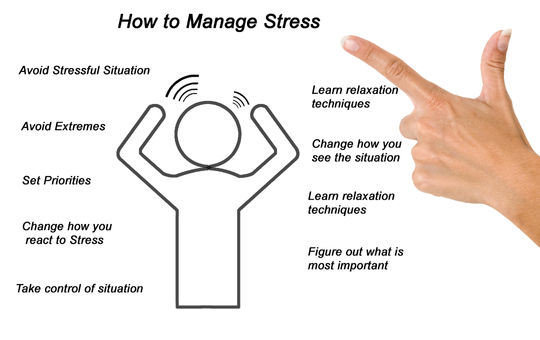Stress Management
Stress is the feeling of being under too much mental or emotional pressure.
Pressure turns into stress when you feel unable to cope. People have different ways of reacting to stress, so a situation that feels stressful to one person may be motivating to someone else.
Many of life's demands can cause stress, particularly work, relationships and money problems. When you feel stressed, it can get in the way of sorting out these demands or can even affect everything you do.
Stress causes a surge of hormones in your body. These stress hormones are released to enable you to deal with pressures or threats – the so-called 'fight or flight' response.
Once the pressure or threat has passed, your stress hormone levels will usually return to normal. However, if you're constantly under stress, these hormones will remain in your body, leading to the symptoms of stress.
Stress is not an illness itself, but it can cause serious illness if it isn't addressed. It's important to recognise the symptoms of stress early. Recognising the signs and symptoms of stress will help you figure out ways of coping and save you from adopting unhealthy coping methods, such as drinking or smoking.
Learning to take care of your own wellbeing is increasingly being acknowledged as a moral imperative – you will be unable to properly look after the animals in your care if you become too emotionally depleted.
Intentional activities – the choices we make – are thought to make a significant contribution to our wellbeing. This is good news because it also means that the choices, we make can lead us to feel better. We cannot change our personal circumstances or genetics; however, we can make positive choices which will help our mental heath.
To seek more help or advise you can also contact Vet Life via https://www.vetlife.org.uk/
You can also help protect yourself from stress in a number of ways:
- Eat healthily. A healthy diet will reduce the risks of diet-related diseases. Also, there is a growing amount of evidence showing how food affects our mood. Feelings of well-being can be protected by ensuring that our diet provides adequate amounts of brain nutrients such as essential vitamins and minerals, as well as water.
- Be aware of your smoking and drinking. Even though they may seem to reduce tension, this is misleading as they often make problems worse.
- Exercise. Physical Excerise can be very effective in relieving stress. Even going out to get some fresh air and doing some light physical exercise, like walking to the shops, can help.
- Take time out. Take time to relax. Saying ‘I just can't take the time off' is no use if you are forced to take time off later through ill health. Striking a balance between responsibility to others and responsibility to yourself is important in reducing stress levels.
- Be mindful. Mindfullness meditation can be practised anywhere at any time. Research has suggested that it can reduce the effects of stress, anxiety and other related problems such as insomnia, poor concentration and low moods, in some people.
- Get restful sleep. Sleeping problems are common when you're suffering from stress. Try to make sure you get enough rest.
- Don't be too hard on yourself. Try to keep things in perspective. After all, we all have bad days.
References:
https://www.mentalhealth.org.uk/explore-mental-health/publications/how-manage-and-reduce-stress
